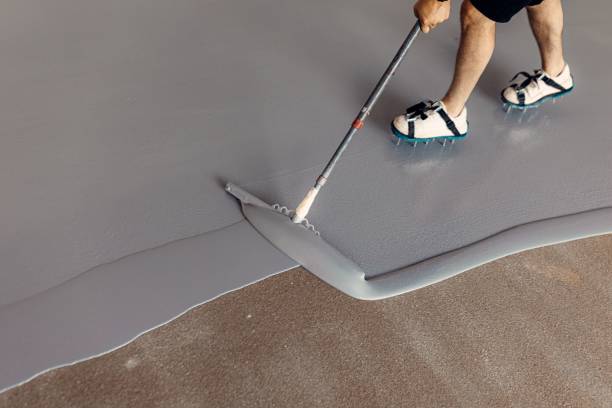General
The Environmental Benefits of Epoxy Flooring in Commercial Spaces

Epoxy flooring is becoming more and more popular in shops and other businesses because it’s strong, looks good, and is easy to take care of. But did you know it’s also good for the environment?
In this article, we’ll talk about how epoxy flooring helps the environment and why it’s a good choice for businesses.
What is Epoxy Flooring?
Epoxy flooring is a versatile and durable flooring solution that has gained significant popularity in various commercial and industrial settings, as well as residential spaces. It is a type of surface coating made by mixing two main components: epoxy resin and a hardening agent or catalyst. When these components are combined, a chemical reaction occurs, resulting in a rigid, plastic-like material that adheres strongly to the surface it’s applied to.
One of the defining characteristics of epoxy flooring is its exceptional durability and strength. It forms a seamless and hard surface that can withstand heavy foot traffic, impacts, abrasion, and chemical exposure. It makes it an ideal choice for spaces that require a resilient and long-lasting flooring solution, such as warehouses, factories, laboratories, garages, and commercial kitchens.
Epoxy flooring is also known for its versatility in terms of design and customization. It can be formulated in various colors and finishes, including high-gloss, matte, or even textured surfaces.
This versatility allows for creative design possibilities, making epoxy flooring not only a practical choice but also an aesthetic one. Whether you’re aiming for a sleek and modern look or a functional, industrial appearance, epoxy flooring can be tailored to meet your specific design preferences and functional requirements.
The Environmental Benefits of Using Epoxy Flooring in Business Spaces
- Reduced Need for Replacement and Maintenance
Epoxy flooring is renowned for its exceptional durability and longevity. This characteristic directly translates to a reduced need for replacement and maintenance over time.
Traditional flooring materials, such as vinyl or carpet, often require frequent replacement due to wear and tear, leading to a significant environmental impact. In contrast, epoxy flooring can last for decades with minimal maintenance, reducing the overall carbon footprint associated with flooring materials.
Replacing flooring materials involves the extraction of raw materials, manufacturing processes, and transportation, all of which contribute to greenhouse gas emissions and resource depletion. By choosing epoxy flooring, businesses can significantly extend the lifespan of their floors, reducing the frequency of replacements and their associated environmental costs.
- Low Volatile Organic Compounds (VOCs)
Volatile Organic Compounds (VOCs) are chemicals emitted as gases from certain materials, including many types of flooring. These compounds can have adverse health effects on humans and contribute to outdoor air pollution. Epoxy flooring, when properly installed, has low VOC emissions, making it a healthier and more environmentally friendly choice for commercial spaces.
By reducing VOC emissions, businesses can contribute to better indoor air quality, protecting the health of employees and visitors while also minimizing the release of harmful pollutants into the atmosphere. It aligns with sustainability goals aimed at reducing the carbon footprint and enhancing the overall well-being of building occupants.
- Energy Efficiency
Epoxy flooring can enhance energy efficiency in commercial spaces. Its reflective properties can increase the amount of natural light in a room, reducing the need for artificial lighting during daylight hours. It not only lowers energy consumption but also contributes to a more comfortable and productive work environment.
Additionally, epoxy flooring can be designed to be slip-resistant, reducing the likelihood of accidents and injuries. It, in turn, helps to minimize the environmental impact associated with healthcare costs and lost productivity resulting from workplace accidents.
- Low-Waste Installation
The installation of epoxy flooring generates less waste compared to many other flooring options. Epoxy is typically applied directly to the existing substrate, eliminating the need for underlayment or adhesives that can contribute to waste. The reduced waste during installation aligns with sustainable practices, reducing the burden on landfills and conserving resources.
Furthermore, epoxy flooring can be installed over existing concrete surfaces, refurbishing older floors rather than replacing them entirely. This process not only minimizes waste but also extends the life of the existing substrate, reducing the environmental impact associated with concrete production.
- Resistance to Chemicals and Stains
Epoxy flooring’s resistance to chemicals and stains is another environmental advantage. In commercial spaces such as laboratories, warehouses, or manufacturing facilities, spills and chemical exposure are common occurrences. Epoxy’s impermeable surface prevents these substances from seeping into the floor, making cleanup easier and reducing the need for harsh cleaning chemicals.
This resistance to chemicals and stains also extends the lifespan of epoxy flooring, reducing the frequency of replacements and the associated environmental costs. Businesses can lower their carbon footprint by choosing a flooring option that requires fewer resources and less frequent manufacturing.
- Reduced Water Usage
Epoxy flooring is typically a dry installation process, meaning it doesn’t require large amounts of water like some flooring materials that involve wet adhesives or grout. The reduced water usage during installation aligns with sustainable practices, as conserving water is a critical component of environmental stewardship, especially in regions with water scarcity.
By choosing epoxy flooring, businesses can contribute to water conservation efforts, further demonstrating their commitment to sustainability.
Recyclability and Minimal Demolition Waste
At the end of its long life cycle, epoxy flooring can be removed without generating excessive demolition waste. Epoxy is a thermosetting polymer, which means it can be ground down and recycled into new epoxy products or used as an aggregate in construction materials. This recyclability reduces the environmental impact of disposal and aligns with the principles of the circular economy.
Additionally, the removal of epoxy flooring generates less waste compared to the removal of some traditional flooring materials, which may include multiple layers of adhesives, underlayment, and flooring itself.
Wrap Up
In conclusion, epoxy flooring offers numerous environmental benefits that make it a sustainable choice for commercial spaces. Its durability, low VOC emissions, energy efficiency, and minimal waste generation during installation and removal contribute to a greener future.
By selecting epoxy flooring, businesses can reduce their environmental footprint while enjoying the functional and aesthetic advantages it offers. As sustainability becomes increasingly important in the commercial sector, epoxy flooring stands out as a responsible choice that aligns with eco-conscious practices and long-term environmental goals.


